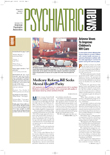Implement federal medical privacy regulations immediately, but with critical changes that will protect the medical privacy for patients and their families, APA Vice President Paul Appelbaum, M.D., told a congressional subcommittee in March. Appelbaum spoke on behalf of APA before the Subcommittee on Health of the Energy and Commerce Committee at the U.S. House of Representatives to emphasize that stronger protections are needed to advance patient privacy.
“Regrettably, it is often overlooked that confidentiality is an essential element of high-quality health care,” said Appelbaum. “Patient privacy is particularly critical in ensuring high-quality psychiatric care.”
Although Appelbaum voiced APA’s concerns that some of the administrative requirements within the regulations as proposed by the outgoing Clinton administration late last year are “unnecessarily complex,” he supported various aspects of the rule, which will take effect in 2003. For example, the rule prohibits the disclosure of psychotherapy notes without the patient’s authorization and gives patients the right to know who has access to their health information. Also, patients may inspect and copy their own health information, with the exception of psychotherapy notes, and request that communications from a health care clinician or health care plan be made in a certain way—for example, a patient can prohibit phone calls being made to them at home.
But there are problems in the current regulations that need to be fixed, according to Appelbaum. For instance, while patients can authorize disclosures of health information when they enter into a health plan, they do not necessarily know what type of information will be released, or to whom—this is known as “blanket consent.” And “while the regulations allow the patient to revoke this consent, [they] do not protect the patient from being dismissed from the plan for doing so.”
Appelbaum also voiced APA’s concerns about a marketing and fundraising provision in the rule that does not require a patient’s authorization for a marketer to advertise to a patient under certain conditions. “For example,” said Appelbaum, “ a marketer could knock on the door of a pregnant woman and try to sell her a product or service.” Also, he said, a covered entity could disclose a patient’s demographic information and dates of health care to a business associate or to a related foundation without the patient’s permission.
“We want all Americans to be free from unreasonable police access to their most personal medical record information,” said Appelbaum, who pointed to the failure of the current rules to allow for such freedom. Under the rule, law enforcement agents would need only to place a written request to doctors, hospitals, and insurance companies to obtain patient records. No judge would be needed to review the requests. “We are very concerned,” continued Appelbaum, that this provision “ would allow for the release of medical record information anytime the police are trying to identify a suspect.”
Appelbaum also addressed concerns that extra provisions made to ensure medical privacy would add an additional burden on physicians and cautioned that this burden might fall heavily on psychiatrists. “[Psychiatrists] will have a heavy administrative burden, such as getting satisfactory assurances from a business associate through a written contract, keeping psychotherapy notes separate and locked away from the rest of the psychiatric record, and providing written notice of their privacy practices to patients.”
Appelbaum concluded by voicing APA’s biggest fear—a reversal of the medical privacy regulations. “Our gravest concern is that certain parties that were disappointed at how protective these regulations are of patient privacy will. . .be arguing for surrendering many of the protections that patients have just gained.”
